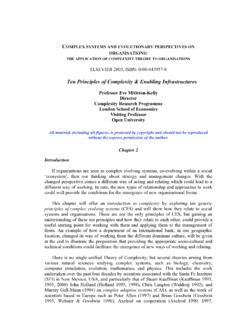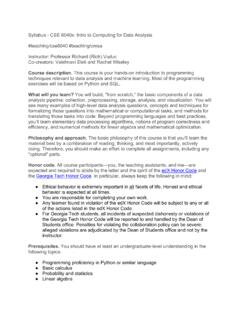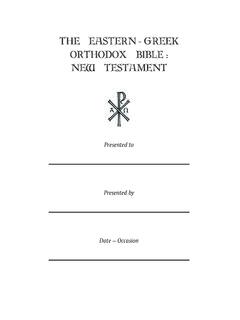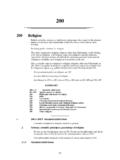Transcription of Evil and Omnipotence J. L. Mackie ,New Series, Vol. 64, No ...
1 AND Omnipotence THEtraditional arguments for the existence of God have been fairly thoroughly criticised by philosophers. But the theologian can, if he wishes, accept this criticism. He can admit that no rational proof of God's existence is possible. And he can still retain all that is essential to his position, by holding that God's existence is known in some other, non-rational way. I think, however, that a more telling criticism can be made by way of the traditional problem of evil. Here it can be shown, not that religious beliefs lack rational support, but that they are positively irrational, that the several parts of the essential theological doctrine are inconsistent with one another, so that the theologian can maintain his position as a whole only by a much more extreme rejection of reason than in the former case. He must now be prepared to believe, not merely what cannot be proved, but what can be disproved from other beliefs that he also holds.
2 The problem of evil, in the sense in which I shall be using the phrase, is a problem only for someone who believes that there is a God who is both omnipotent and wholly good. And it is a logical problem, the problem of clarifying and reconciling a number of beliefs : i t is not a scientific problem that might be solved by further observations, or a practical problem that might be solved by a decision or an action. These points are obvious ; I mention them only because they are sometimes ignored by theologians, who sometimes parry a statement of the problem with such remarks as "Well, can you solve the problem yourself ? " or "This is a mystery which may be revealed to us later " or " Evil is something to be faced and overcome, not to be merely discussed ". In its simplest form the problem is this : God is omnipotent ; God is wholly good ; and yet evil exists. There seems to be some contradiction between these three propositions, so that if any two of them were true the third would be false.
3 But a t the same time all three are essential parts of most theological positions : the theologian, it seems, a t once must adhere and cannot consistently adhere to all three. (The problem does not arise only for theists, but I shall discuss i t in the form in which it presents itself for ordinary theism.) However, the contradiction does not arise immediately ; to show it we need some additional premises, or perhaps some 200 EVIL AND Omnipotence 201 quasi-logical rules connecting the terms 'good ', ' evil ', and 'omnipotent '. These additional principles are that good is opposed to evil, in such a way that a good thing always elimi- nates evil as far as it can, and that there are no limits to what an omnipotent thing can do. From these it follows that a good omnipotent thing eliminates evil completely, and then the propositions that a good omnipotent thing exists, and that evil exists, are incompatible. A. Adequate Solutions Now once the problem is fully stated i t is clear that i t can be solved, in the sense that the problem will not arise if one gives up a t least one of the propositions that constitute it.
4 If you are prepared to say that God is not wholly good, or not quite omni- potent, or that evil does not exist, or that good is not opposed to the kind of evil that exists, or that there are limits to what an omnipotent thing can do, then the problem of evil will not arise for you. There are, then, quite a number of adequate solutions of the problem of evil, and some of these have been adopted, or almost adopted, by various thinkers. For example, a few have been prepared to deny God's Omnipotence , and rather more have been prepared to keep the term ' Omnipotence ' but severely to restrict its meaning, recording quite a number of things that an omnipotent being cannot do. Some have said that evil is an illusion, perhaps because they held that the whole world of temporal, changing things is an illusion, and that what we call evil belongs only to this world, or perhaps because they held that although temporal things are much as we see them, those that we call evil are not really evil.
5 Some have said that what we call evil is merely the privation of good, that evil in a positive sense, evil that would really be opposed to good, does not exist. Many have agreed with Pope that disorder is harmony not understood, and that partial evil is universal good. Whether any of these views is true is, of course, another question. But each of them gives an adequate solution of the problem of evil in the sense that if you accept it this problem does not arise for you, though you may, of course, have other problems to face. But often enough these adequate solutions are only almost adopted. The thinkers who restrict God's power, but keep the term ' Omnipotence ', may reasonably be suspected of thinking, in other contexts, that his power is really unlimited. Those 202 J. L. Mackie : who say that evil is an illusion may also be thinking, inconsis- tently, that this illusion is itself an evil. Those who say that "evil " is merely privation of good may also be thinking, incon- sistently, that privation of good is an evil.
6 (The fallacy here is akin to some forms of the "naturalistic fallacy " in ethics, where some think, for example, that " good " is just what contributes to evolutionaryp progress, and that evolutionary progress is itself good.) If Pope meant what he said in the first line of his couplet, that " disorder " is only harmony not under- stood, the "partial evil " of the second line must, for consis- tency, mean " t h a t which, taken in isolation, falsely appears to be evil ", but i t would more naturally mean ('that which, in isolatioa, really is evil ". The second line, in fact, hesitates between two views, that "partial evil " isn't really evil, since only the universal quality is real, and that " partial evil " is really an evil, but only a little one. I n addition, therefore, to adequate solutions, we must recog- nise unsatisfactory inconsistent solutions, in which there is only a half-hearted 'or temporary rejection of one of the pro- positions which together constitute the problem.)
7 In these, one of the constituent propositions is explicitly rejected, but it is covertly re-asserted or assumed elsewhere in the system. B. Fallacious Solutions Besides these half-hearted solutions, which explicitly reject but implicitly assert one of the constituent propositions, there are definitely fallacious solutions which explicitly maintain all the constituent propositions, but implicitly reject a t least one of them in the course of the argument that explains away the problem of evil. There are, in fact, many so-called solutions which purport to remove the contradiction without abandoning any of its con- stituent propositions. These must be fallacious, as we can see from the very statement of the problem, but it is not so easy to see in each case precisely where the fallacy lies. I suggest that in all cases the fallacy has the general form suggested above : in order to solve the problem one (or perhaps more) of its con- stituent propositions is given up, but in such a way that it appears to have been retained, and can therefore be asserted without qualification jn other contexts.
8 Sometimes there is a further complication : the supposed solution moves to and fro between, say, two of the constituent propositions, a t one point asserting the first of these but covertly abandoning the second, EVIL AND Omnipotence 203 a t another point asserting the second but covertly abandoning the &st. These fallacious solutions often turn upon some equivocation with the words ' good ' and ' evil ', or upon some vagueness about the way in which good and evil are opposed to one another, or about how much is meant by ' Omnipotence '. I propose to examine some of these so-called solutions, and to exhibit their fallacies in detail. Incidentally, I shall .also be considering whether an adequate solution could be reached by a minor modification of one or more of the constituent pro-positions, which would, however, still satisfy all the essential requirements of ordinary theism. 1. " Good cannot exist without evil " or ''Evil is necessary as a counterpart to good.
9 " It is sometimes suggested that evil is necessary as a counter- part to good, that if there were no evil there could be no good either, and that this solves the problem of evil. It is true that it points to an answer to the question "Why should there be evil ? " But it does so only by qualifying some of the pro- positions that constitute the problem. First, it sets a limit to what God can do, saying that God cannot create good without simultaneously creating evil, and this means either that God is not omnipotent or that there are some limits to what an omnipotent thing can do. It may be replied that these limits are always presupposed, that Omnipotence has never meant the power to do what is logically impossible, and on the present view the existence of good without evil would be a logical impossibility. This interpretation of Omnipotence may, indeed, be accepted as a modiiication of our original account which does not reject anything that is essential to theism, and I shall in general assume i t in the subsequent discussion.
10 It is, perhaps, the most common theistic view, but I think that some theists a t least have maintained that God. can do what is logically impossible. Many theists, a t any rate, have held that logic itself is created or laid down by God, that logic is the way in which God arbitrarily chooses to think. (This is, of course, parallel to the etbical view that morally right actions are those which God arbitrarily chooses to command, and the two views encounter similar difficulties.) And this account of logic is clearly inconsistent with the view that God is bound by logical neces- sities-unless it is possible for an omnipotent being to bind himself, an issue which we shall consider later, when we come t o the Paradox of Omnipotence . This solution of the problem 204 J. L. Mackie : of evil cannot, therefore, be consistently adopted along with the view that logic is itself created by God. But, secondly, this solution denies that evil is opposed t o good in our original sense.
















